China imposes tariff on Aussie barley imports
The Federal Government has ruled out retaliation against Beijing in fear of sparking a US-style trade war after after Chinese officials slapped an 80 per cent tariff on Australian barley.
Coronavirus
Don't miss out on the headlines from Coronavirus. Followed categories will be added to My News.
- Where Aussies will be able to holiday first
- China’s desperation to control COVID-19 narrative deepens
Australia will fight to overturn China’s crippling tariff on barley imports but wants to avoid a US-style trade war with the powerful nation.
Agriculture Minister David Littleproud has called for “calm” after Chinese officials slapped an 80 per cent tariff on Australia overnight, but said Australia would consider referring the matter to the World Trade Organisation.
“This is a disagreement on one commodity out of hundreds that go over (to China),” he said.
“We will calmly and methodically work through it … but we will stand up for Australia’s sovereignty and our farmers’ rights.”
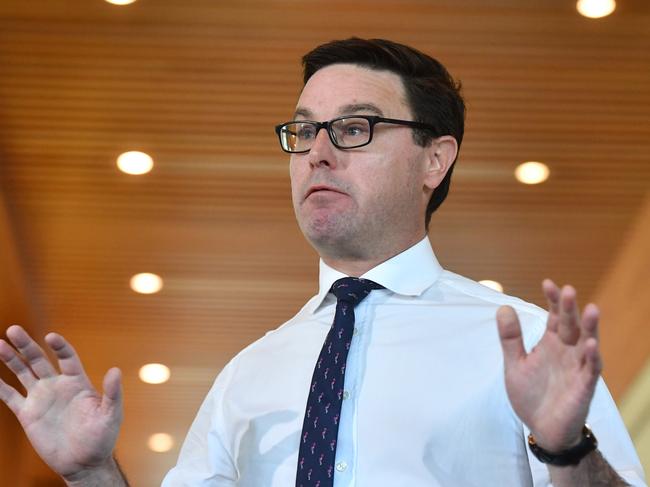
Mr Littleproud dismissed suggestions Australia was approaching a “trade war” with China, saying he and Trade Minister Simon Birmingham had made it clear they were open to talking with Beijing, despite not hearing from officials in more than a week.
“(We) have both said that our phone is always on and our door is always open,” he said.
Mr Littleproud said the federal government was already sounding out alternative markets for Australian barley, to save growers from a $600 million annual hit caused by the tariff.
India, Indonesia, Saudi Arabia and Kuwait are among the possible trading partners who might seek to buy more Australian barley.
‘No trade war’: Australia won’t respond
Mr Birmingham said Australia would not respond with retaliatory tariffs.
“Australia is not interested in a trade war. We don’t pursue our trade policies on a tit-for-tat
basis. We will continue to operate as we always do,” he said.
Mr Birmingham said while the 80 per cent tariff on barley was a “real blow” for Australian farmers, it would also hurt Chinese breweries.
“This is not just bad news for Australian farmers, it will be Chinese breweries and Chinese consumers who end up paying more or getting substandard product from other countries in the future as a result of this,” he said.
Mr Birmingham said China’s decision concerned the government “deeply” as it was clear the country did not understand the facts.
“(The tariff) appears to have been based without a proper understanding of the facts or the evidence,” he said.
Mr Birmingham said China had denied there was a link between the barley dispute and Australia’s push for an independent inquiry into the COVID-19 pandemic.
“I can understand why people draw those links – particularly given the unhelpful comments of the Chinese Ambassador to Australia a few weeks ago,” he said.
“In the end, China denies there’s a link.
“The only thing we can do in defence of our farmers is engage in the process as constructively as we can.”
Farmers’ fury at China tax
National Farmers Federation chief Tony Mahar said growers were “frustrated” and “deeply concerned” about the barley tariff.
“The new tariffs will significantly curtail and, most likely stop, exports of Australian barley to China by artificially increasing the price, until the situation can be can resolved,” he said.
“In the interim it is absolutely crucial that the Australian Government continues to seek to address this issue through diplomatic channels with their Chinese counterparts.
Mr Mahar said Australian growers were among the “least subsidised” in the world.
“The idea that Australian barley has been ‘dumped’ in China doesn’t match the realities of Australian grain production,” he said.
More than two thirds of Australia’s agricultural production is exported, and up to 30 per cent of that goes to China.
Diplomatic tensions on the rise
Diplomatic tensions between Canberra and Beijing have soared after Australia pushed for an inquiry into the origins of coronavirus.
More than 110 nations including China backed the inquiry at the World Health Assembly on Monday night.
Mr Birmingham earlier slammed China’s decision to impose the punitive anti-dumping tariff on Australian growers for at least the next five years.
“Australia is deeply disappointed with China’s decision to impose duties on Australian barley,” he said.
“We reject the basis of this decision and will be assessing the details of the findings while we consider next steps.”
Mr Birmingham said Australia reserved its rights to appeal the matter further.
“We … are confident that Australian farmers are among the most productive in the world, who operate without government subsidy of prices,” he said.
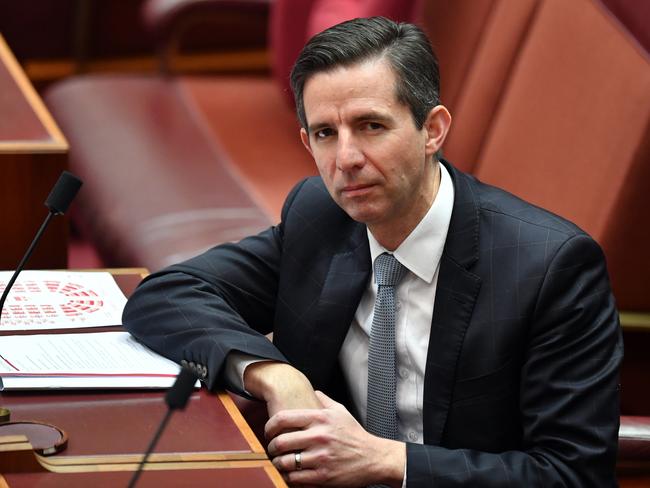
Australia is the biggest barley supplier to China, exporting more than half of its exports worth up to $2 billion a year.
Producers will be on the hunt for new export markets with India and Indonesia, which has recently signed a trade deal with Australia, considered prime options.
China’s ‘dumping’ claim
China gave Australia just 10 days to respond to a draft proposal for the tariff, and was sent a final case within a week, with evidence presented by Australia totalling 10,000 pages throughout the dispute.
Beijing officials claim drought assistance measures and a diesel fuel rebate amount to “subsidies” for farmers, despite many of the measures not being in place when the concern was first raised 18 months ago.
They have also pointed to infrastructure investment along the Murray Darling River as unfairly assisting barley growers, but the crop is not grown in those areas.
Despite this evidence, from Tuesday China will hit Australian barley coming into China with an anti-dumping duty rate of 73.6 per cent and anti-subsidy duty rate of 6.9 per cent.
China snubs Australia
Chinese officials have refused to return a call to Mr Birmingham after he requested they discuss the barley tariff and a recent beef import ban.
Earlier, Beijing officials again snubbed Australia by refusing to answer questions about its antagonistic trade moves against barley and meat producers in a controversial media conference.
In an hour-long press conference Chinese Commerce Minister Zhong Shan did not call on any Australian journalists trying to ask about the barley tariffs and beef import bans, and would not accept questions from other reporters on the issue.
Bill Birtle, an ABC journalist who was at the press conference, criticised the Chinese official’s refusal to engage with Australian media.
“In one hour of questions, China’s Commerce Minister Zhong Shan’s assistant refused to call on Australian media to ask about the barley (and) beef issue, even though we had to register three days in advance and advise of our question,” he said on Twitter.
Meanwhile Mr Birmingham confirmed on Monday morning he had still not heard from his Chinese counterpart after requesting a call regarding the beef import ban imposed on four Australian abattoirs a week ago.
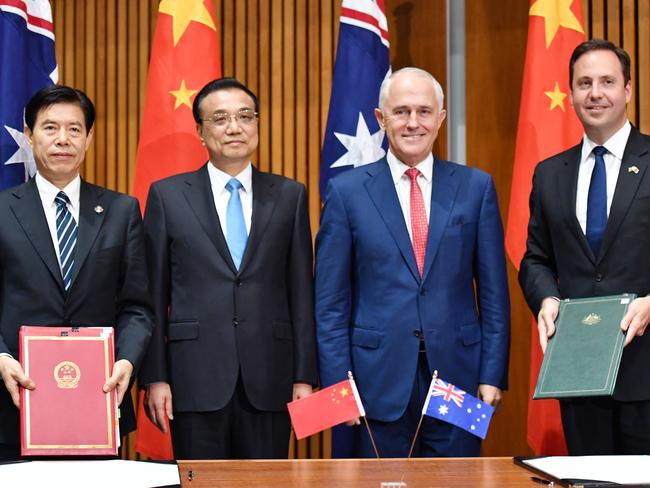
“That’s not stopping us from mounting very strong and compelling arguments back to Chinese authorities in relation to these barley and beef trade issues that they’ve raised with us,” he said.
Mr Birmingham said it didn’t matter how tough or difficult the conversation would be with China on any policy, Australia would “always be up for it”.
“But when it comes to these trade issues as well, we’re not just hanging it all on whether or not I can have a conversation with somebody, we’re putting every possible effort in to make sure that Chinese authorities, right through the system, get the evidence they need,” he said.
“They’ve publicly and privately said these are technical trade disputes that hang off of a weight of evidence.
“And so, we’ve made sure we provide some pretty weighty evidence, there’s more than 10,000 pages of evidence backing our argument that Australian barley is (priced) competitively.”
The next industries to be hit
Wool, wine, and seafood industries have the most to lose if China enacts further bans like those that have already threatened to decimate the beef and barley industry.
China has banned the importation of Australian beef and imposed an 80 per cent tariff on barley exports.
China is the industry’s biggest international market, worth about $1.3 billion, according to Grain Growers chairman Brett Hosking, who said they were in a “holding pattern” while awaiting the determination.
Tensions between the two countries have risen due to Australia’s push for an inquiry into COVID-19 and Chinese Ambassador Cheng Jingye has warned the review could lead to Chinese consumers boycotting Australian products.
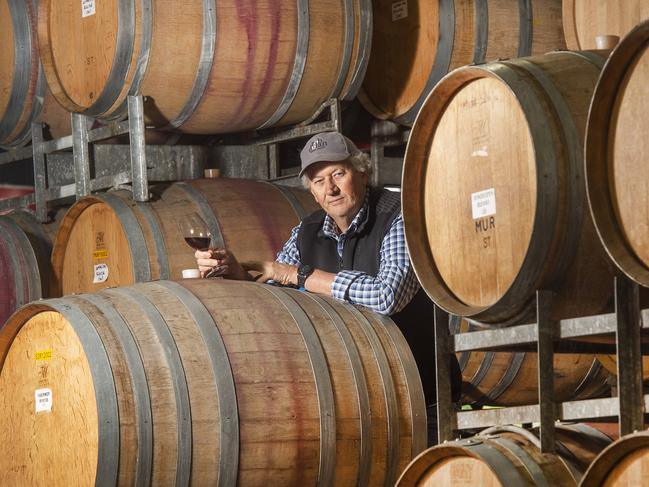
The wool industry – which exported $3.6 billion internationally in 2016-17 – has already taken a hit amid the COVID-19 virus and Australian Wool Growers Association director Robert Ingram said any restrictions would “purely be malicious”.
“China takes over 85 per cent of our clip and the Italian market has been decimated by the coronavirus,” he said.
“If they slapped any restrictions on the wool trade, it would be catastrophic.
“I cannot see how they would justify any action they would take against wool.”
The wine industry is also particularly vulnerable to any adverse reaction from China which imported $1.1 billion worth of Australian product in the last 12 months.
CEO of Australian Grape and Wine Tony Battaglene said China was a big part of the industry’s recovery from COVID-19 as they had started reopening the economy.
He said any disruptions would have a “big impact”, but didn’t anticipate any bans or tariffs.
“Everyone is concerned when there’s any tensions, we’re not seeing any immediate threat though to the wine industry which is good,” Mr Battaglene said.
“It’s hard to see they would impose tariffs, it’s hard to see a justification for them, so I don’t even really think that’s in the frame.”
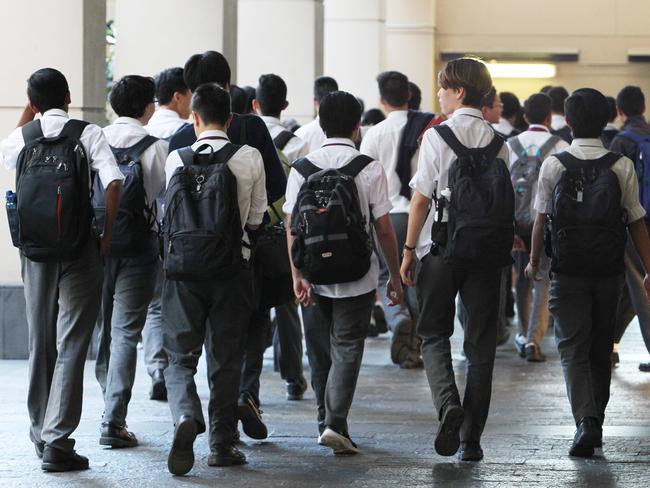
Seafood is big business in China with almost 94 per cent of Australia’s rock lobster going to the country in 2019, representing $714 million of a $762 million export industry.
Seafood Industry Australia declined to comment on how any bans or tariffs would impact the industry.
The education industry has already received the threat of boycotts which Mr Cheng flagged as a possibility saying, “The parents of students would also think … whether this is the best place to send their kids”.
According to the Australian Bureau of Statistics, international education is worth $37.6 billion to the Australian economy.
International Education Association of Australia CEO Phil Honeywood said strong “people-to-people links” had been established between the two countries due to a high number of Chinese students in Australia and he hoped in the absence of a ban “families would just vote with their feet”.
“Clearly any industry that relies so heavily on the Chinese market would have concerns going forward,” he added.
Director of the Australian Strategic and Policy Institute’s Defence, Strategy and National Security program, Michael Shoebridge told News Corp while Mr Cheng had threatened product boycotts, it was more likely he was leveraging reduced consumer spending in China to pressure the Australian Government.
“Really a big driver in reduced sales is economic trouble inside China. So they can market it as we are punishing you when in fact their economy is in trouble,” he said.
In response to Mr Cheng’s warning students may not want to come to Australia, Mr Shoebridge said it was “deeply hypothetical”.
Mr Shoebridge said Chinese students were unlikely to come to Australia for “some time” regardless, due to travel bans.
“He’s (Mr Cheng) making a threat about something that’s already happened, not by Chinese government decision but through the pandemic.”
